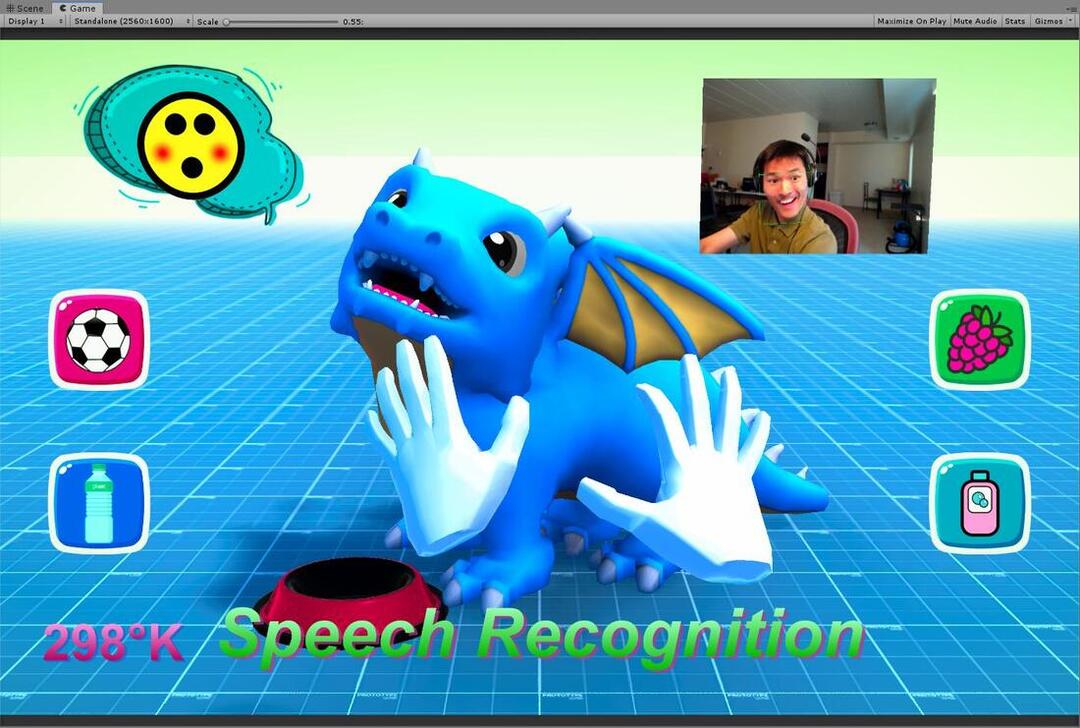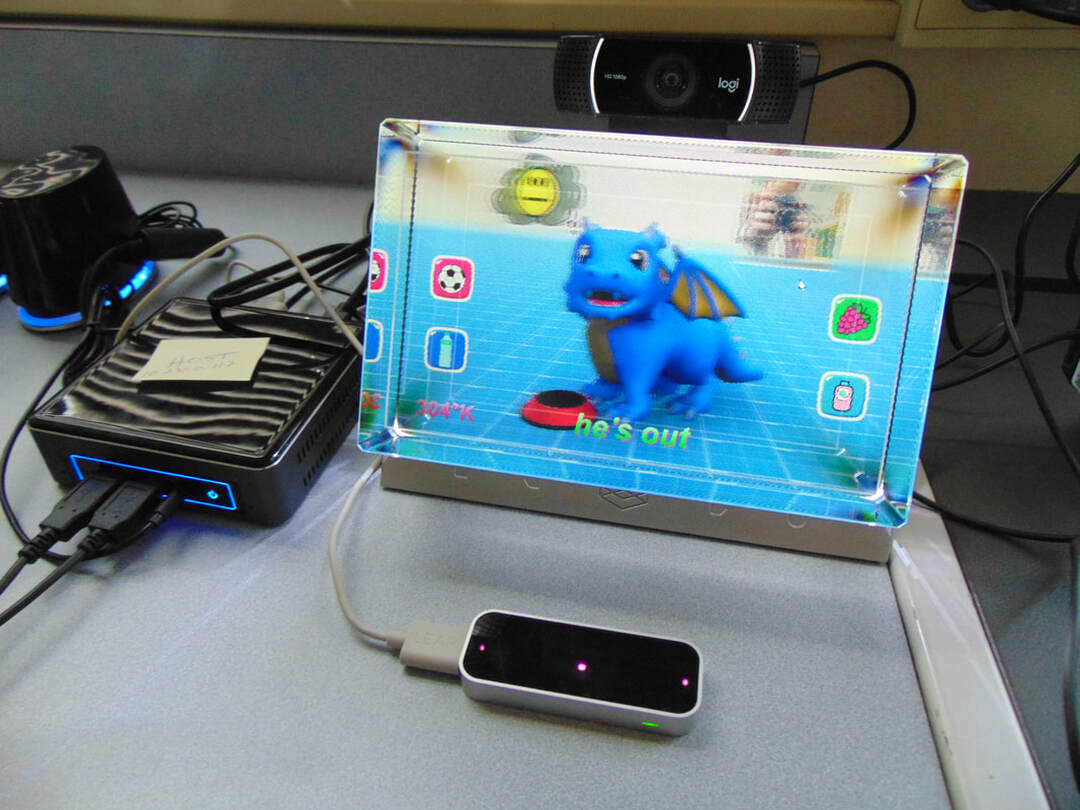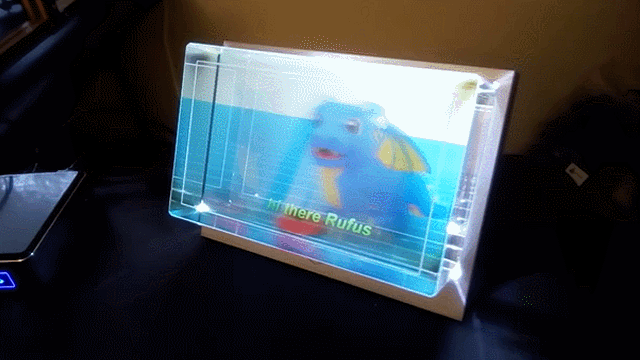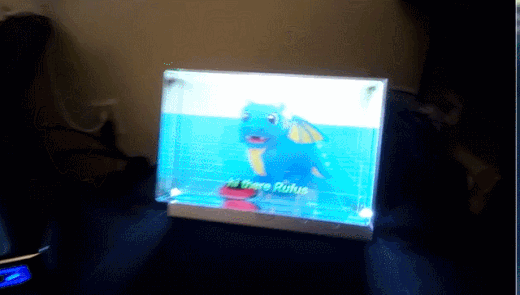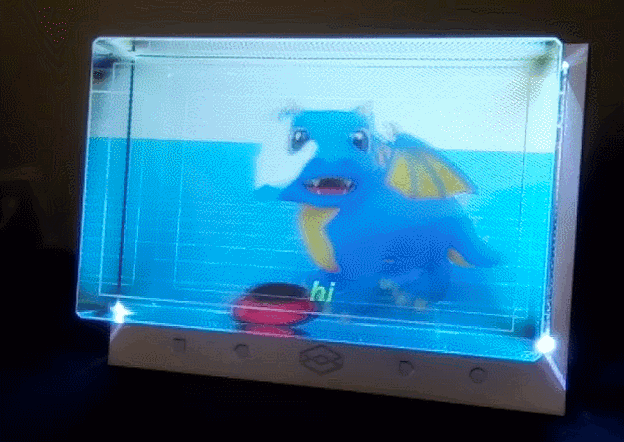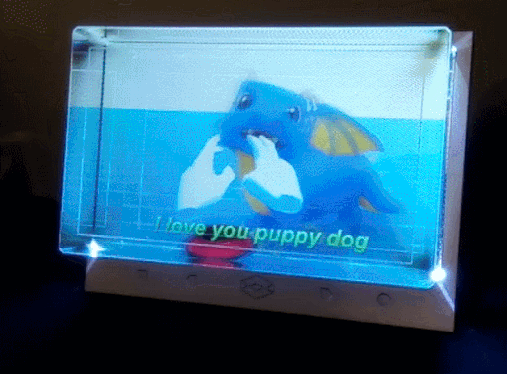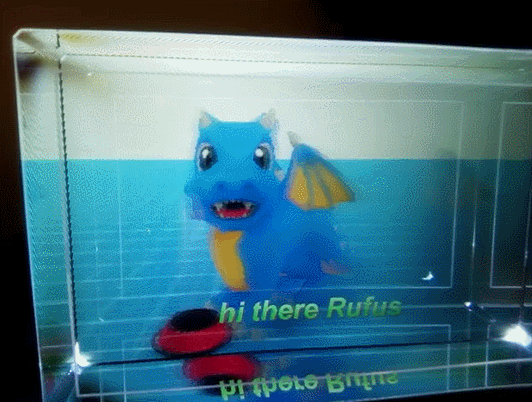Mt. Lebanon Virtual Pet /Summer 2019
Rufus the Virtual Pet Dragon getting petted with live digital hands on a Leap Motion Gesture Controller and real-time facial tracking.
Summary
The school is a community of practice in which learning, experimentation, and the opportunity for reflection are the norm. It is with this mindset that we embark on this collaborative project attempting to enhance the student experience in Mellon Middle School of Mt. Lebanon School District. Our goal was to envision, create, and put into place a product that will use artificial intelligence to make a positive impact on school climate. We created a “virtual team pet” that will “live” within Mellon Middle School's four 8th grade Iron Brigade team classrooms. This pet embodies three pillars: CASEL’s five components of SEL, AMLE’s 16 Characteristics of Successful Schools, and scientifically proven benefits of pet therapy. Middle level students make multiple transitions between classrooms each day, and relationships are at the core of student-centered practices and can increase students’ feeling of connectedness to school. Computer-based applications can support real-time assessments that can aid in both implementation and program evaluation efforts. As new technological innovations appear, so will ideas about how they can be used most effectively in SEL programming. This collaboration between an interdisciplinary middle level team, private industry, and an institution of higher learning is an attempt to combine current best practices in SEL, middle level education, pet therapy, and emerging AI technology to enhance student experiences within Mt. Lebanon School District's “Schools to Watch” middle school.
The school is a community of practice in which learning, experimentation, and the opportunity for reflection are the norm. It is with this mindset that we embark on this collaborative project attempting to enhance the student experience in Mellon Middle School of Mt. Lebanon School District. Our goal was to envision, create, and put into place a product that will use artificial intelligence to make a positive impact on school climate. We created a “virtual team pet” that will “live” within Mellon Middle School's four 8th grade Iron Brigade team classrooms. This pet embodies three pillars: CASEL’s five components of SEL, AMLE’s 16 Characteristics of Successful Schools, and scientifically proven benefits of pet therapy. Middle level students make multiple transitions between classrooms each day, and relationships are at the core of student-centered practices and can increase students’ feeling of connectedness to school. Computer-based applications can support real-time assessments that can aid in both implementation and program evaluation efforts. As new technological innovations appear, so will ideas about how they can be used most effectively in SEL programming. This collaboration between an interdisciplinary middle level team, private industry, and an institution of higher learning is an attempt to combine current best practices in SEL, middle level education, pet therapy, and emerging AI technology to enhance student experiences within Mt. Lebanon School District's “Schools to Watch” middle school.
The hardware setup featuring an Intel NUC Mini PC, Leap Motion Controller, Logitech Webcam, and a revolutionary 3D Looking Glass Hologram.
Rationale
Relationships and emotions affect how we learn and how we use what we learn. While emotions can generate an active interest in learning and sustain our engagement in it, unmanaged stress and poor regulation of impulses interfere with attention and memory and contribute to behaviors disruptive to learning. Furthermore, learning is intrinsically a social and interactive process. It takes place in collaboration with one’s teachers, in the company of one’s peers, and with the support of the school climate. Relationships are the engine of learning. Current best practice guidelines for middle level education recognize the diverse developmental needs of this age group and the importance of promoting both academic and personal development, including social and emotional competence. SEL knowledge, skills, and attitudes are especially relevant during adolescence because youth at this stage are going through rapid physical, emotional, and cognitive changes. These changes create unique opportunities for middle schools. At the classroom level, the quality of teacher-student interactions is one of the most important predictors of student academic performance and adjustment. Interpersonal and organizational factors at the school level also influence students’ academic performance and adjustment, in part through their effect on school climate. Students who perceive a positive climate in their school demonstrate higher levels of social competence and report fewer personal problems. In schools characterized by supportive relationships, common goals and norms, and a sense of collaboration, students perform better academically and have fewer behavior problems. In short, quality relationships are important dimensions of school climate.
Relationships and emotions affect how we learn and how we use what we learn. While emotions can generate an active interest in learning and sustain our engagement in it, unmanaged stress and poor regulation of impulses interfere with attention and memory and contribute to behaviors disruptive to learning. Furthermore, learning is intrinsically a social and interactive process. It takes place in collaboration with one’s teachers, in the company of one’s peers, and with the support of the school climate. Relationships are the engine of learning. Current best practice guidelines for middle level education recognize the diverse developmental needs of this age group and the importance of promoting both academic and personal development, including social and emotional competence. SEL knowledge, skills, and attitudes are especially relevant during adolescence because youth at this stage are going through rapid physical, emotional, and cognitive changes. These changes create unique opportunities for middle schools. At the classroom level, the quality of teacher-student interactions is one of the most important predictors of student academic performance and adjustment. Interpersonal and organizational factors at the school level also influence students’ academic performance and adjustment, in part through their effect on school climate. Students who perceive a positive climate in their school demonstrate higher levels of social competence and report fewer personal problems. In schools characterized by supportive relationships, common goals and norms, and a sense of collaboration, students perform better academically and have fewer behavior problems. In short, quality relationships are important dimensions of school climate.
Partner Organizations
|
Carnegie Mellon University Entertainment Technology Center (https://www.etc.cmu.edu/)
The ETC is the premiere professional graduate program for interactive entertainment as it’s applied across a variety of fields, exploring transformational games, innovation by design and interactive storytelling. The ETC excels at creating an educational environment in which interdisciplinary students acquire collaboration, creativity and communication expertise while applying their artistic and technical skills through design-based research projects. Mt. Lebanon School District (https://mms.mtlsd.org/) The public school system in Allegheny County for residents of Mt. Lebanon, Pennsylvania, a suburb of Pittsburgh, Pennsylvania. The district has won multiple National Blue Ribbon School awards.[7] The high school was rated as one of the Top 500 high schools in the United States by Newsweek in 2000 and 1st in Western Pennsylvania by the Pittsburgh Business Times in 2005.[8] Automadable (https://automadable.com/) Your friendly, neighborhood automation company. Automadable is a small business automation company. We specialize in rapid prototyping technology solutions across the entertainment, education, and hospitality industries. |
| Mt Lebanon Virtual Pet Full Documentation.pdf | |
| File Size: | 4241 kb |
| File Type: | |
